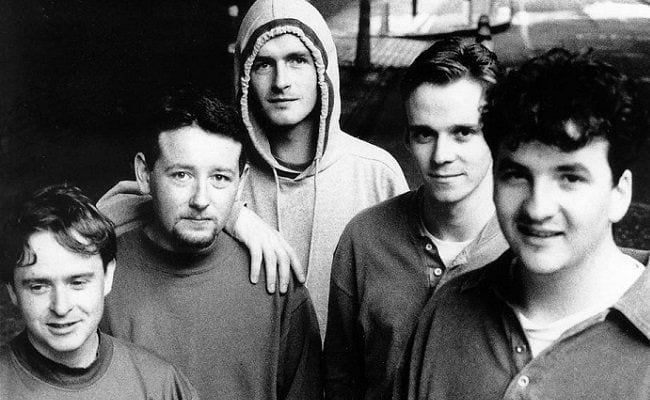
In a 2015 PopMatters feature, writer Elodie Roy found that when it came to the sounds that emanated out of the short-lived niche label Sarah Records, “there was something rather esoteric [it]. The label was simultaneously too much of this world (radically enmeshed with the life of Bristol) and not of this world at all. It reminded me a bit of Folkways, the New York dream of a street song-hunter — a universe within the universe, extremely politicized yet also defiantly self-enclosed.”
For the Orchids, a Scottish-bred, Bristol-adopted jangle pop outfit, their sound was at times lo-fi but never without a hint of sweetness to it. They were a bit quiet regarding getting out in front of the press, but they made up for that with absolute proficiency, churning out three full-lengths and even a compilation between 1989 and 1994, to say nothing of their non-album singles (of which there were oh so many).
Thus, here comes Who Needs Tomorrow… a 30 Year Retrospective, a compilation set where the title tells you all you need to know. A two-disc affair, the first serves as an updated greatest hits for the group, here rounding up the greatest tracks from both their early ’90s era as well as their reunited 2007-2014 works. The second disc is both a greater way to explore their aesthetic as well being as a treasure trove for completists, rife with demos, lesser-heard sessions and even a new take on an old one-off single that the band felt revisiting.
The lineup — which contained James Hackett (vocals), Ian Carmichael (producer + keyboards), Pauline Hynds Bari (vocals), John Scally and Matthew Drummond (both on guitar), Chris Quinn (drums), and James Moody (bass) — found great fun in marrying fastly-strummed guitars to sticky-sweet melodies, perhaps no better emphasized than on “What Will We Do Next”, their third-ever single. While newcomers will likely take it all in stride, some more devout fans may (rightly) bicker over what exactly should have been included on the Best Of portion — like opting for “Apologies” from their I’ve Got a Habit EP instead of the far-superior title track — but such quibbles are minor: by the time you make it out to the 1992 Striving for Lazy Perfection album and its respective title track, decked out in percolating keyboards and snap-in string sections, it’s hard to complain about the journey you’ve taken.
Amazingly, in reconciling the large decade-plus gap in the band’s history, their two eras blend rather nicely. Some may have doubted whether or not they’d be able to do a mid-tempo ballad as plainspoken as their classic “Long Drawn Sunday Night”, but the 2010 Lost Star cut “The Girl and The Soldier” shows that even 15-plus years removed from their supposed heyday, they can still find new contours to their stories, using modern technology very sparingly in search of a sound that is fundamentally Orchid-centric. “Something’s Going On”, a jangle-template number of curious suspicion, very much sounds like it could’ve come out in 1991 and fit in with the era perfectly.
Even hardcore fans of the band must admit that when the Orchids’ songs are packed so tightly together, there’s a bit of textural monochromaticism that hits the listeners, Hackett’s everyman vocals sometimes doing little to prevent some tracks from blurring together. The rode their groove with vigor, but these songs sometimes borrowed tricks and structures from each other. And make no doubt: as beloved as they are, the Orchids were never innovators, their influences like Aztec Camera, Haircut 100, and Orange Juice being worn on their sleeves at all times, which is why some tracks me echo back to more commercially viable acts of the era.
Yet credit is where credit’s due. The second disc of rarities features a wide range of lo-fi sounds, high-polished studio works, dirty acoustic guitars, and unamplified electrics meshing together. Continuing the fine Sarah Records tradition of getting the most bang for a consumer’s buck (i.e. how the Orchids’ singles almost never made it onto their full-lengths), the rarities set here features no carryovers from the previous disc, the demos and acoustic versions all for other songs that, if you wanted to find the original, you’d have to find for yourself.
Some, however, may prefer the versions contained in the odds-and-sods side, with the acoustic version of “It’s Only Obvious” featuring a sweet guitar dropoff in the bridge to help land its careful sentiment. The demo version of “And When I Wake Up” sounds even more like a Stone Roses ripoff than the studio version does, but it makes for wonderfully a curious detour, as does “Placa San Sebastian”, a B-side from a 2011 single that has never been released on CD and features the group’s most dynamic backing vocals ever recorded.
It’s small little treasures like this that makes a compilation of their three decades of material worth just about anyone’s time. Despite one’s griping about influences or melodic homogeny, the Orchids never set out to break new barriers: they just wanted to make the best damn pop songs that they could to make their own self-enclosed universe, and here that universe has been condensed into a lovingly-packaged two-disc jewel case.


![Call for Papers: All Things Reconsidered [MUSIC] May-August 2024](https://www.popmatters.com/wp-content/uploads/2024/04/all-things-reconsidered-call-music-may-2024-720x380.jpg)



